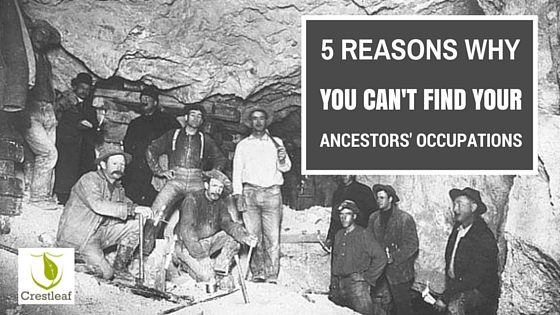
Research Mistakes & Remedies

Photo credit: By Pierce, C.C. (Charles C.), 1861-1946 [Public domain], via Wikimedia Commons
Family historians should always be thinking of out-of-the-box ways to trace the steps of their ancestors, especially when they hit brick walls. But what if you’ve finally found a handful of your once-elusive ancestors, yet still can’t seem to figure out their occupations? Not only can this leave gaps in your family’s story, but it can also be rather frustrating when you wish to create a more robust and comprehensive family history.
If you think you’ve exhausted every available research resource, but still can’t figure out your ancestors’ occupations, then you could be making some fairly common research faux pas. And just as there are unique tips for finding your ancestors online, there are other ways to find your ancestors’ occupations — you just have to be willing to dig a little more deeply.
Why You Can’t Find Your Ancestors’ Occupations
The following common mistakes may be keeping you from finding your ancestors’ occupations. If you’re making any of them, consider taking a heavy dose of our research remedies!
1. Only Searching the Obvious Records

Searching certain occupational records can often be a great way to figure out an ancestor’s line of work. But if you’re simply searching the most obvious record types (think union, retirement, and trade association records), then you may not find your ancestor’s occupation at all!
Research Remedy:
- Search Federal Records – By 1850, the US Federal Census started listing occupations for each enumerated individual — not just heads of household.
- Search Vital Records – If you want to find your ancestors’ occupations, try searching death certificates, marriage licenses, and other vital records as they sometimes note occupations of the person in question.
- Search City Directories – If you know the city in which your ancestor lived, you can always look through that city’s old directory to find their occupation. It was fairly common to list residents’ occupations here.
- Search Military Draft Records – Was your ancestor drafted into the military in the United States? If so, keep in mind that occupations were listed on draft registration cards for World Wars I and II.
2. Not Researching Historic Newspapers

I don’t think we can stress enough just how important it is to research old newspapers to trace your roots and find valuable information about your ancestors. Newspapers can offer up a great deal of clues about your ancestors’ occupations.
Research Remedy:
Start researching historical newspapers right now! Look through articles, legal notices, classified ads, and even advertisements. You’ll be surprised at how many clues you may have been overlooking for far too long.
3. Devaluing Volunteer Work

Think about it: If you are a family historian or genealogist by trade, volunteering for your local family history or genealogical library may just seem like second nature. And just like you, your ancestors would use their occupational skills to volunteer for various organizations and committees in their own communities. This is something that is often overlooked when searching for an ancestor’s occupation.
Research Remedy:
If you know your ancestor volunteered time to a certain group or organization, then pay close attention to the skills they brought to the table. This could be your clue as to what they did for a living! Unsure if your ancestor was a volunteer? Don’t forget to ask your immediate and extended family members for some insight.
4. Forgetting About Family Heirlooms

Those dusty books, broken watches, and knick knacks from yesteryear could hold key information to discovering a family member’s occupation. So, head on up to the attic to sift through your hand-me-down family heirlooms, or pay a visit to Great Aunt Abigail and ask to take a closer look at her bookshelf and fireplace mantle.
Research Remedy:
Pay close attention to old membership pins, occupational awards, cuff links, watches, and other items that could all contain workplace logos, union emblems, and even inscriptions. Those old books on your great aunt’s shelf may also contain inscriptions with clues about your ancestor’s occupation if gifted from a boss or coworker. Plus, old holiday menus and even office newsletters may offer information about the company for which your ancestor worked.
5. Neglecting Tax Records

Just as you shouldn’t forget to file your taxes, you should also remember to search through tax records to find valuable information about your ancestors — including their occupations. Of course, just like doing your taxes, searching through records of this type can also be…taxing. It may take you a while to find what you’re looking for, but you should never let that stop you from completing this crucial part of your ancestry search.
Research Remedy:
Bite the bullet, and begin that taxing search through different types of tax records such as land taxes, personal property taxes, and more. Once you know what types of taxes your ancestor paid, this could provide some tell tale clues about his occupation. Perhaps your ancestor was taxed on a large amount of heavy machinery. Figure out what it was used for, and that could provide a clue as to what he did for a living.
Do you have other tips on how to find ancestors’ occupations? Let us know in the comments!
This entry was originally posted by Crestleaf inGenealogy 101,Genealogy Resources,Genealogy Tipsand taggedfamily history tips,genealogy brick wall,genealogy tipsonAugust 25, 2015byNatalie L.
Like what you read? Subscribe to the Genealogists.com blog above and automatically receive our next article.




.jpg)